Antonia Malchik recently published a little story about a fox, a story that stepped sideways into the early history of property rights in the United States. This side story was the legal case of Pierson vs Post, where, in historic cartoon fashion, Post hunted the fox, Pierson killed the fox. The question for the court and for legal students since 1805 was - and is - who owned the fox?
There were decisions, appeals, but Antonia Malchik, in her brief essay, posed an alternative question and, in doing so, smashed open the previous arsenic bottle worth of assumptions.
Her question? “Yet none of us asked: what of the fox herself?”
Out here in the real world - the breathing forest; the cloud dancing and owl staring planet of real places - there is no ownership. The fox, she suggested, had the most say in who owned the fox. But underneath her literary bridge linking the world of legal systems to a morning on a verandah in Montana, was the hint, the gentle reminder, that the fox in the story was an individual, part of a wild green network of neighbours, who were in turn part of an interconnectedness of so much more, both separate and whole. The context for her was, first, a morning with her daughter and the surprise gift of a visiting fox. Second, the wider context of her work in the sacredness of the commons, and her quiet, thoughtful activism of reminders of life outside and before the theft of so much human geography.
Nature writing needs to hold this fox in a fistful of Important Things. These are my feelings, of course, but I’m laying it out here as someone practicing, observing and pacing through the woods of language and connection. Does that make me an expert? What? As if. I guess it makes me an impassioned participant, one who sees we can no longer walk alone. It means there’s a lot I don’t know (I recognise that goes for all of us) and I’m curious; I want to explore, to contribute what I can in an emergency. Without - and I don’t know how to do this yet - getting too tired.
“The fox” in this instance you can hold in your hand as a symbol; a pawprint pressed into yours as a reminder: that there are a few elder ideas we need to accept back into our language, our writing. This is one of them. For the sake of the conservation of the world. For the liberation of all things living.
We are all kin.
“Yet none of us asked: what of the fox herself.”
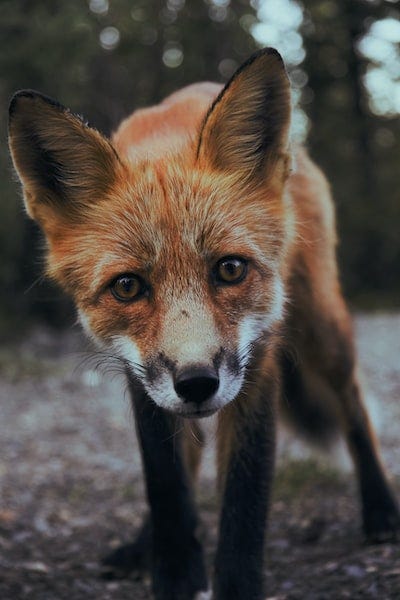

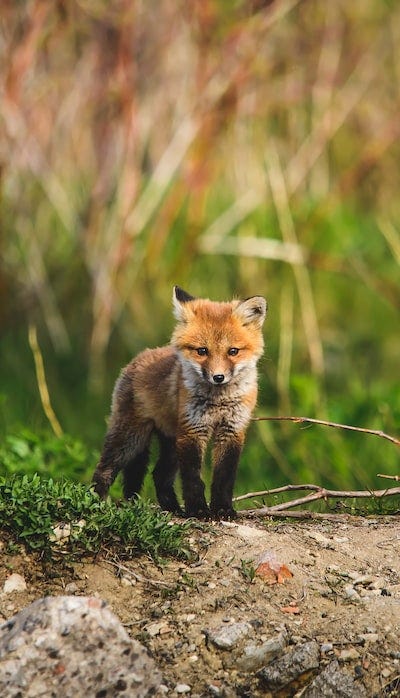
We are all kin.
From this spills a bees’ nest of flourishing songs: we are all equal, culture is everywhere, language is all around you like a mad marketplace, and questions: does kin extend to plants? (Yes) To microbes? (Yes) including culture and language? (Yes). And what about things we don’t even think of as being “alive”, like mountains, wind (yes) or stories?
Yes.
And has the vast majority of humanity always known this? Of course, yes. Indigenous wisdom (which we are all connected to somewhere, somehow) weaves this inspararable from language.
Those of us within the industrial english culture, those of us here embracing words and language and her connection and music, can become singers of change, from resistance to subtly spreading new forests of felt understanding, with this one simple pawprint (and leafprint, and dreamprint):
We are all kin.
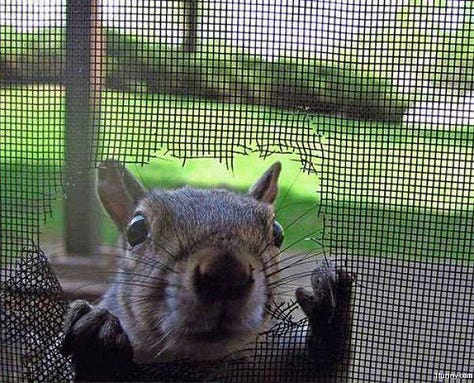

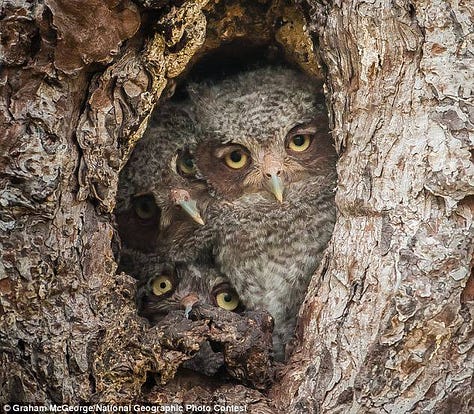
Practicing that in our writing is the thing. Industrial english has captured a beautiful living mongrel of a language - English - and mimiced it with toxic substitutes, then crop-sprayed that poison across the world. Don Watson in his influential book, Weasel Words, did a great job of bringing people’s attention to the plastic things the spill from corporations and politicians as “words.” That very term, weasel word, is now part of our language. (Go English! You gluey amorphous welcoming thing.) Don Watson, though, failed to say what to do about it, how to change things. Frustrating! Like a shrug and a dopey uncle grin of well, there’s nothing we can do.
There’s something we can do.
This is important, because the twisting of language has been used to make grievous changes in the world - the actual world. People’s lives. And because we breathe words, swim in writing, talk, it’s hard to see the changes at work. To even know to look. And as you’re probably aware, there are a lot of people - from public relations to propoganda to government departments - working hard to keep it that way.
But the answer is basic. Primal, even. There is a language below language that connects all of us across a kinship web. Of life. These days, thanks to the work on tree networks, you could call it mycelial, too. It’s this: when you write from a place that excludes thinking, you open up to writing from that web. That place, that elemental place, is stronger by far, by way far, by infinity bubbles, than anything manufactured. It comes from your heart, and lands directly in the heart of your reader. And it can’t be stopped.
There’s more that deepens this effect: intention, reciprocity, to name a couple. Editing for clarity, like polishing a window, to “have a transparency between your heart and the world,” in the words of Richard Flanagan. The popularity of what these days is called freewriting is a gate to this place, but then comes integrity, then comes an openness to listening. Then comes the work of connecting.
Writing is a relationship.
The workshops, Heart & Place, were set up to experience what this language felt like. You may have twigged, because we’re talking kinship, that this language is bigger than one person; is also the raw voice of that one person living a planet-sized connection with another. And that’s huge. That elemental voice is a reckoning that can change the world.
And so. The world’s need has grown more urgent. The choir of heart’s voices, working with the voices of the earth, heard and unheard, is what has driven me to let go of those workshops for a while (two years it’s been!!) and wait and listen for what’s needed. The short answer: kinship, voicing together.
A little while back a group of us met at the Japanese Gardens in Gosford to discuss all this. Many had walked the Heart & Place journey, some also Mind & Earth, the re-engaging of the mind for editing, and style, and a lot of other bits and pieces and oddities, after building a foundation of heart. This was, as well, a therapy for me too, for re-engaging with the world after so much has happened. I would be remiss not to express a grateful group hug.
In the spirit of this expanding approach, after presenting some thoughts to the gathering, I listened a lot. The weave of what I heard was miraculous. Simple on the outside, a complex living growing wonder on the inside.
Like an egg. In a nest.
I’m trying to keep hold of the memories of so many things we’ve covered in the last two decades. It’s hard, but this letter has given me hope: I keeping scrolling to the end and writing notes - it’s the easiest place to write them before I forget. Please let me know if I forget to cover them!
There will be other voices here as we explore and grow. I’ll also be sharing the journey and bringing to bear those notes and ideas from the last 20 years or so. There is a lot to share. But a fair focus will be on this new journey. I hope I - and everyone at this end - can meet you here as often as possible.

Notes for future letters
Trees of Stone. Seriously, these trees are astonishing. And the Country of which they are a part is, I have to admit, an unsettling thing to write of. Only, though, because of how I’ve been inculturated. That is, inside an extreme cult of rationalism. I heard a scientist on ABC (Australia) say - offhand, inbetween sentences on his main topic - that, “…we’ve disproved psychic phenomena by the way…” And suddenly a large chunk of the world ceased to exist, according to this man. No wonder people think it’s okay to blow up mountains, or sacred sites, or mow down forests…
Types of editing. An extension from the Mind & Earth workshops. I never thought I covered this enough. So here it is, more. Heart, clarity, flexibility, music, small bits and others. Now also kinship.
Ooh! Don’t let me forget about Lyall Watson, James Lovelock and Gaia Theory - why don’t we hear this discussed any more? What was the mad emotional resistance? And especially now. Especially now. And it may be a space to talk about one of my favourite things: the biology of the cosmos. Does it relate to writing? Yes! Everything does! Although this might crop up in Nature writing over the fence of ideas, where we break out (a bit) from the history of mental enclosures. Breaking up patterns of thinking? This is a proper recurring thing for the crucial living relevance of writing. That’s why New cultural frameworks: not just visiting but staying overnight could be an important one.
Nature Writing’s new edge. This is only a little old but, I realise now, sits right in the nest of kinship.
Old classics for writing: Where do you anchor your faith? Detail and rhythm. Respect (another editing one). And music, probably the most powerful of the basics.
Fire Trees, which may crop us alongside Stone Trees. I’ll take you to the first registered catastrophic fire on the planet, how nature helped protect some people, what we’ve learnt from that, and how practice of that can help you, too. Oh, and if I can, what Black Wattle tells us about community. And the surprising kindness of a marketing sales call.
Other writing thinkers in the space of climate, spirit, indiginous work, kinship and community. I’ll give you lists so you can head off on field trips and sabbaticals. Or a half day picnic, depending on how you feel on the day.
Reclaiming words, and the work of Kathleen Dean Moore.
And we might touch on wild writing, bone writing, grounding the poetic, literary mud pies. Plus, writing with action only three words here, but hopefully we’ll be growing them into something much bigger in the world. Also a crucial part of the new workshops.
The distraction of the alien conversation, the beauty of deep sea earth and things we might have missed and how to cope with them. Just suggestions. Making it relevant to writing and what the world needs, promise.
Somewhere in amongst it all, I have to mention the most powerful sentence I have ever come across in English.
And, and, you must not let me forget to write about a little black bird off the coast of Aotearoa/New Zealand. Something to break your heart and also fill you with hope.
Editing Notes
The first sentence originally looked like this:
Antonia Malchik recently published a little story about a fox, [that] stepped sideways into a story on the early history of property rights in the United States.
When I read it back for the third time, my mind pictured the fox stepping sideways. Which it literally means. What I meant was that Antonia stepped her story away to the side of the original thread. So, to make that clearer:
Antonia Malchik recently published a little story about a fox, [a story that] stepped sideways into [a story on] the early history of property rights in the United States.
Now I have an excess ‘story’. I obviously need to cut out this repetition, and in doing so a nice and balanced flow emerges, into the early history… Which is a nice surprise. Now we have it as it finally appears:
Antonia Malchik recently published a little story about a fox, a story that stepped sideways into the early history of property rights in the United States.
It has rhythm now; the music flows. This is an example of editing for clarity. Often this happens, too, where one type of editing has an automatic knock on in the editing process. The music wants to be heard.
Language Warning
“Believe.”
When used in a sentence like, say, “The tribal people of xxxx believe,” then all you have is something truly condescending. A colonial musket shot.
Ha ha, this phrase says, this unsophisticated lot still think blah. Not like us, enlightened and scientific. Plastic, you know. Terribly digital. Pass me that pith helmet, would you? It’s getting rather hot out here these days…
This comment is (ironically perhaps) a tribalism one. The tribe doing the name-calling in this case is called rationalism. Or, to be clearer, the cult of rationalism: somewhere, in a test tube on a rocky outcrop in a small corner of the world, a group of armchair cynics, reductionist scientists and some media people are arguing and pontificating on the fact that the ground everywhere is smooth, and that the sky is a glass wall.
Want to feel this use of this word in your body? Stand up, cross your arms, and think smug.
Normal Notes
Antonia Malchik writes On the Commons, which can be found at antonia.substack.com. If you want to take a short cut straight through Montana’s North Fork Valley to the little cabin she was writing in, and the fox story, go this way
Right at the bottom here is a little comment bubble. That’s our bubble. Writing is a relationship in a lot of directions. If you feel like commenting and connecting then perhaps both our writings will grow.


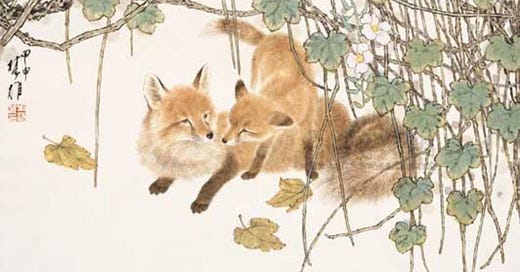



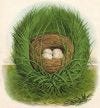

Stone trees, flame trees, Gaia theory and bone writing, a bird to break your heart and the most powerful sentence we have… flashes of life in the undergrowth, a distant song on the wind; teasers for future conversations! Thank you Peter, I look forward to the unfurling of many more stories to connect and inspire.
And more. I hadn't known the full meaning and origin of 'weasel words', and my curiosity was piqued to enquire. Clever weasel is thought to be able to suck the tasty innards of an egg for his lunch, leaving an intact shell that belies its emptiness. May the Nest hold and protect the embryos of meaning-rich language, living ideas as they grow, spread wings and fly.
Great post Peter.